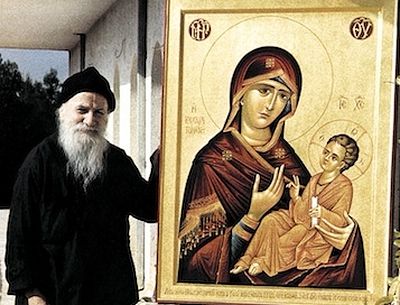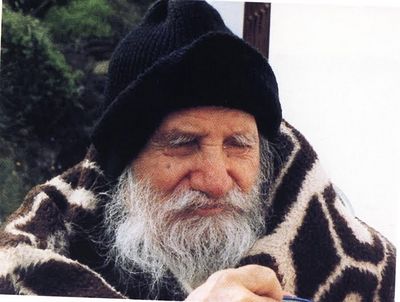Today marks the first commemoration of St. Porphyrios (Bairaktaris) of Kafsokalivia. This elder of our own times left such extraordinarily wise teachings for contemporary Christians that the book about him, Wounded by Love, is still one of the most popular among the Orthodox. We present here a few things the elder had to say about some of our most pressing issues in life: the Church, the healing quality of our religion, child rearing, depression, and illness.
In the Church we are all one and Christ is the head
 St. Porphyrios (Bairaktaris) of Kafsokalivia
St. Porphyrios (Bairaktaris) of Kafsokalivia
The Church and Christ are one. The body cannot exist without its head. The body of the Church is nourished, sanctified and lives with Christ. He is the Lord, omnipotent, omniscient, everywhere present and filling all things, our staff, our friend, our brother: the pillar and sure foundation of the Church. He is the Alpha and the Omega, the beginning and the end, the basis—everything. Without Christ the Church does not exist. Christ is the Bridegroom; each individual soul is the Bride.
Christ united the body of the Church with heaven and with earth: with angels, men and all created things, with all of God’s creation with the animals and birds, with each tiny wild flower and each microscopic insect. The Church thus became the fullness of Him who fills all in all, (Eph. 1:23) that is, of Christ. Everything is in Christ and with Christ. This is the mystery of the Church.
Christ is revealed in that unity between His love and ourselves: the Church. On my own I am not the Church, but together with you. All together we are the Church. All are incorporated in the Church. We are all one and Christ is the head. One body, one body of Christ: You are the body of Christ and individually members of it. (1 Cor. 12:27) We are all one because God is our Father and is everywhere. When we experience this we are in the Church. This is our Lord’s wish for all the members of the Church as expressed in His great high-priestly prayer: that they may be one. (John 17:11,22) But that’s something you can only understand through grace. We experience the joy of unity, of love, and we become one with everyone. There is nothing more magnificent!
The important thing is for us to enter into the Church—to unite ourselves with our fellow men, with the joys and sorrows of each and everyone, to feel that they are our own, to pray for everyone, to have care for their salvation, to forget about ourselves, to do everything for them just as Christ did for us. In the Church we become one unfortunate, suffering and sinful soul.
No one should wish to be saved alone without all others being save. It is a mistake for someone to pray for himself, that he himself may be saved. We must love others and pray that no soul be lost, that all may enter into the Church. That is what counts. And it is with this desire one should leave the world to retire to a monastery or to the desert.
When we set ourselves apart from others, we are not Christians. We are true Christians when we have a profound sense that we are members of the mystical body of Christ, of the Church, in an unbroken relationship of love—when we live united in Christ, that is, when we experience unity in His Church with a sense of oneness. This is why Christ prays to His Father saying, that they may be one. He repeats the prayer again and again and the apostles emphasize it everywhere. This is the most profound aspect, the most exalted meaning, of the Church. This is where the secret is to be found: for all to be united as one person in God. There is no other religion like this; no other religion says anything of this sort. They have something to say, but not this mystery, this exquisite point of the mystery which Christ demands and tells us that this is how we must become, that he wants us to be His.1
The Christian religion transforms people and heals them
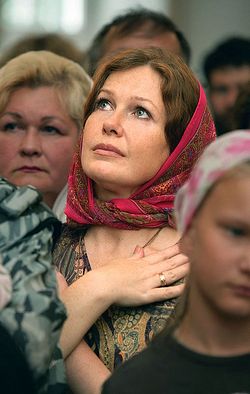
For many people, however, religion is a struggle, a source of agony and anxiety. That’s why many of the “religiously minded” are regarded as unfortunates, because others can see the desperate state they are in. And so it is. Because for the person who doesn’t understand the deeper meaning of religion and doesn’t experience it, religion ends up as an illness, and indeed a terrible illness…
In fact, the Christian religion transforms people and heals them. The most important precondition, however, for someone to recognize and discern the truth is humility. Egotism darkens a person’s mind, it confuses him, it leads him astray, to heresy. It is important for a person to understand the truth.
Long ago when people were in a primitive state they didn’t have houses or anything. They would go into caves without windows. They would block up the entrance with stones and branches so that the wind didn’t blow in. They didn’t realize that outside there is life, oxygen. When he is enclosed in a cave, a person is worn down, he becomes ill, he is destroyed, whereas when he is outside he is revitalized. Can you understand the truth? Then you are out in the sun, in the light; you see all the magnificence of creation; otherwise you are in a dark cave. Light and darkness. Which is better? To be meek, humble, peaceful and to be filled with love, or to be irritable, depressed and to quarrel with everyone. Unquestionably the higher state is love. Our religion has all these good things and is the truth. But many people go off in another direction.
All those who deny this truth are psychologically ill. They are like those children who became delinquent or anti-social because they lost their parents, or because their parents divorced or quarreled. And all those confused people find their way into various heresies. The confused children of confused parents.
But all these confused and ant-social persons have a strength and perseverance and achieve a great many things. They succeed in bringing normal and peaceable people into subjection. They influence other like-minded people and they prevail in the world because they are in the majority and find themselves followers. Then there are others who, although they do not deny the truth, are nevertheless confused and psychologically ill.
Sin makes a person exceedingly psychologically confused. And nothing makes the confusion go away—nothing except the light of Christ. Christ makes the first move: Come unto me all you who labour… (Mt. 11:28) Then we accept this light with our good will, which we express through our love towards Him, through prayer, through our participation in the life of the Church, and through the sacraments.2
Love always understands the need to make sacrifices
Love always understands the need to make sacrifices. Whatever is done under coercion always causes the soul to react with rejection. Love attracts the grace of God. When grace comes, then the gifts of the Holy Spirit come. The fruit of the Spirit is love, joy, peace, long-sufferance, gentleness, goodness, faith, meekness, self-control. (Gal. 5:22-23) These are the things that a healthy soul in Christ should have.
With Christ a person is filled with grace and so lives above evil. Evil does not exist for him. There is only good, which is God. Evil cannot exist. While there is light there cannot be darkness. Nor can darkness encompass him because he has the light.3
Overcoming Depression
 St. Porphyrios (Bairaktaris) of Kafsokalivia
St. Porphyrios (Bairaktaris) of Kafsokalivia
Pain is a psychological power that God implanted in us with a view to doing us good and leading us to love, joy, and prayer. Instead of this, the devil succeeds in taking this power from the battery of our soul and using it for evil. He transforms it into depression and brings the soul into a state of lethargy and apathy. He torments us, takes us captive and makes us psychologically ill.
There is a secret. Turn the satanic energy into good energy. This is difficult and requires some preparation. The requisite preparation is humility. With humility you attract the grace of God. You surrender yourself to the love of God, to worship and to prayer. But even if you do all in the world, you achieve nothing if you haven't acquired humility. All the evil feelings, insecurity, despair and disenchantment, which come to take control of the soul, disappear with humility. The person who lacks humility, the egotist, doesn't want you to get in the way of his desires, to make any criticism of him or tell him what to do. He gets upset, irritated and reacts violently and is overcome by depression.
This state is cured by grace. The soul must turn to God's love. The cure will come when we start to love God passionately. Many of our saints transformed depression into joy with their love for Christ. That is, they took this power of the soul, which the devil wished to crush, and gave it to God and they transformed it into joy and exultation. Prayer and worship gradually transform depression and turn it into joy, because the grace of God takes effect. Here you need to have the strength to attract the grace of God, which will help you to be united with Him. Art is required. When you give yourself to God and become one with him, you will forget the evil spirit which drags at you from behind, and this spirit, when it is disdained, will leave. And the more you devote yourself to the Spirit of God, the less you will look behind to see the spirit that is dragging at you. When grace attracts you, you will be united with God. And when you unite yourself to God and abandon yourself to Him, everything else disappears and is forgotten and you are saved. The great art, the great secret, in order to rid yourself of depression and all that is negative is to give yourself over to the love of God.
Something which can help a person who is depressed is work, interest in life. The garden, plants, flowers, trees, the countryside, a walk in the open air—all these things tear a person away from a state of inactivity and awake other interests. They act like medicines. To occupy oneself with the arts, with music and so on, is very beneficial. The thing that I place top of the list, however, is interest in the Church, in reading Holy Scripture and attending services. As you study the words of God you are cured without being aware of it.
Let me tell you about a girl who came to me. She was suffering from dreadful depression. Drugs had no effect. She had given up everything—her work, her home, her interests. I told her about the love of Christ which takes the soul captive because the grace of God fills the soul and changes it. I explained to her that the force which takes over the soul and transforms the power of the soul into depression is demonic. It throws the soul to the ground, torments it and renders it useless. I advised her to devote herself to things like music, which she had formerly enjoyed. I emphasized, however, most of all her need to turn to Christ with love. I told her, moreover, that in our Church a cure is to be found through love for God and prayer, provided this is done with all the heart.4
What saves and makes for good children is the life of the parents in the home
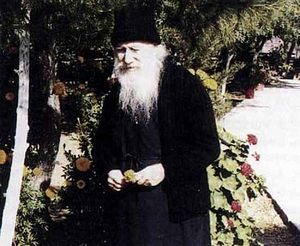 St. Porphyrios (Bairaktaris) of Kafsokalivia
St. Porphyrios (Bairaktaris) of Kafsokalivia
The behavior of the children is directly related to the state of the parents. When the children are hurt by the bad behavior of the parents towards each other, they lose the strength and desire to progress in their lives. Their lives are constructed shoddily and the edifice of their soul is in constant danger of collapsing. Let me give you two examples.
Two sisters came to see me. One of them had gone through some very distressing experiences and they asked me what was the cause of these. I answered them:
“It's because of your home; it stems from your parents.' And as I looked at the girl I said:
'These are things you've inherited from your mother.”
“But,” she said, “my parents are such perfect people. They're Christians, they go to confession, they receive Communion and we had a religious upbringing. Unless it is religion that is to blame...”
I said to them:
“I don't believe a word of all that you're telling me. I see one tiling only, and that is that your parents don't live with the joy of Christ.”
On hearing this, the other girl said:
“Listen, Maria, the Father's quite right. Our parents go to confession and receive Holy Communion, but did we ever have any peace at home. Our father was constantly complaining about our mother. And every day either the one refused to sit at the table or the other refused to go out somewhere together. So you see what the Father is saying is true”…
A psychological state is created in a child as a result of its parents that accompanies it throughout its life. Its later behavior and its relationships with others are directly connected with the experiences that it carries with it from its childhood years. The child grows up and develops, but at bottom it does not change. This is manifested even in the smallest expressions of life. For example, you get a craving for food and want to eat. You take something and eat it, then you see something else and you want that. You feel hungry and think that if you don't eat you'll feel faint and you'll start to tremble. You're afraid you'll lose weight. This is a psychological state that has its explanation. Perhaps you never knew your father or your mother, and you feel deprived and hungry, poor and weak. And this psychological reality is expressed by way of reflex as a weakness of the body.
A large part of the responsibility for a person's spiritual state lies with the family. For children to be released from their various inner problems it is not enough for them to receive good advice, or to be compelled by force; nor do logical arguments or threats do any good. These things rather make matters worse. The solution is to be found through the sanctification of the parents. Become saints and you will have no problems with your children. The sanctity of their parents releases the children from their problems. Children want to have saintly people at their side, people with lots of love who will neither intimidate them nor lecture them, but who will provide a saintly example and pray for them. You parents should pray silently to Christ with upraised arms and embrace your children mystically. When they misbehave you will take some disciplinary measures, but you will not coerce them. Above all you need to pray.5
A child needs to be surrounded by people who pray and pray ardently

Mothers know how to express anxiety, offer advice and talk incessantly, but they haven't learned to pray. Most advice and criticism does a great deal of harm. You don't need to say a lot to children. Words hammer at the ears, but prayer goes to the heart. Prayer is required, with faith and without anxiety, along with a good example.6
Not always what you think
One day a lady went to get some advice about her children. She spoke to him about all her children and about the different problems she had with them. She had absolutely no problem at all, as she put it, with the youngest child. He was so good that everyone in the village said he should become a priest.
When the lady finished telling her story, Elder Porphyrios told her she should not be so sure about her youngest child. He saw that her biggest and most real problems would be created by that very child.
She flew into a rage. She started yelling at the Elder, accusing him of saying her child was something other than how she described him. Generally, she treated him in a very rude manner. (You'll allow us not to mention—besides, it is not necessary—the epithets that she applied to the Elder, as he himself told us).
Some time passed. One day, the Elder heard a lady outside of his room yelling, practically screaming,
"Let me see the Elder. Let me kiss his feet and maybe he will forgive me. May God forgive me for the terrible sin which I committed against him."
The Elder Porphyrios then asked a nun to escort the lady in. When she went into his room, she fell at his feet, wailing, asking again and again for forgiveness.
When she had come round she explained that the very same child about whom he had spoken to her, suddenly started to change from one day to the next and became unrecognizable. From being the studious child that he was, he stopped studying for his lessons. He had gotten mixed up with bad company and he was always away from home. One day he reached the point of throwing a heavy object at his father's head after he had made some remark to his son. From that moment he left the house and, despite the fact they had been looking for him for days, they could not find him anywhere.
His unfortunate mother was kneeling asking for forgiveness from the Elder. She pleaded with him to pray to God to enlighten her child to return to his home.
Elder Porphyrios told us this story during a conversation about relationships between parents and children. He gave the subject immense importance.7
What is required is a lot of prayer and few words
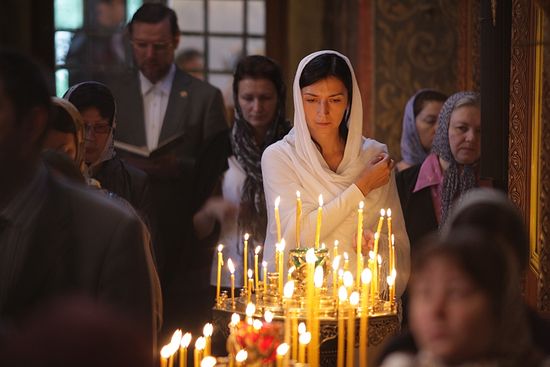
All things are achieved through prayer, silence and love. Have you understood the effects of prayer? Love in prayer, love in Christ. That is what is truly beneficial. As long as you love your children with human love—which is often pathological—the more they will be mixed-up, and the more their behavior will be negative. But when the love between you and your children is holy and Christian love, then you will have no problem. The sanctity of the parents saves the children. For this to come about, divine grace must act on the souls of the parents. No one can be sanctified on his own. The same divine grace will then illuminate, warm and animate the souls of the children. People often telephone me from abroad and ask me about their children and about other matters. Today a mother phoned me from Milan and asked me how she should behave towards her children. What I said to her was this:
“Pray, and when you have to, speak to your children with love. Lots of prayer and few words. Lots of prayer and few words for everyone. We mustn't become an annoyance, but rather pray secretly and then speak, and God will let us know in our hearts whether the others have accepted what we have said. If not, we won't speak. We will simply pray mystically. Because if we speak we become an annoyance and make others react or even infuriate them. That is why it is better to speak mystically to the heart of others through secret prayer rather than to their ears.
Pray and then speak. That's what to do with your children. If you are constantly lecturing them, you'll become tiresome and when they grow up they'll feel a kind of oppression. Prefer prayer and speak to them through prayer. Speak to God and God will speak to their hearts. That is, you shouldn't give guidance to your children with a voice that they hear with their ears. You may do this too, but above all you should speak to God about your children. Say, "Lord Jesus Christ, give Your light to my children. I entrust them to You. You gave them to me, but I am weak and unable to guide them, so, please, illuminate them." And God will speak to them and they will say to themselves, "Oh dear, I shouldn't have upset Mummy by doing that!" And with the grace of God this will come from their heart.'
This is the most perfect way—for the mother to speak to God and for God to speak to the children. If you do not communicate in this way, constant lecturing becomes a kind of intimidation. And when the child grows up it begins to rebel, that is, to take revenge, so to speak, on its father and mother who coerced it. One way is the perfect way—for the mother's and father's holiness and love in Christ to speak. The radiance of sanctity and not human effort makes for good children.
When the children are traumatized and hurt on account of some serious situation, don't let it affect you when they react negatively and speak rudely. In reality they don't want to, but can't help themselves at difficult times. They are remorseful afterwards. But if you become irritated and enraged, you become one with the evil spirit and it makes a mockery of you all.8
On illness: the secret is to struggle to acquire the grace of God
We benefit greatly from our illnesses, as long as we endure them without complaint and glorify God, asking for His mercy. When we become ill, the important thing is not that we don’t take medicines or that we go and pray to Saint Nektarios. We need also to know the other secret, namely, to struggle to acquire the grace of God. This is the secret. Grace will teach us all the other things, namely, how to abandon ourselves to Christ. That is, we ignore the illness, we do not think about it, we think about Christ, simply, imperceptibly and selflessly and God works His miracle for the good of our soul. Just as we say in the Divine Liturgy, “we commend all our life to Christ our God.”
But we need to wish to ignore the illness. If we don’t wish to, it’s difficult. We can’t simply say, “I ignore it”. And so although we think that we are ignoring it and giving no thought to it, in point of fact we have it in our mind continually and we cannot find peace within ourselves. Let me prove this to you. We say: “I believe that God will cure me. I won’t take any medicine. I’ll stay awake all night and I’ll pray to God about it and He will hear me.” We pray all night long, we make entreaty, we call on and coerce God and all the saints to make us well. We go to one place and another. With all these things don’t we show that we are far from ignoring the illness? The more we insist and blackmail the saints and God to make us well, the more acutely we feel our illness. The more we strive to get rid of it, the more we feel it. And so we achieve nothing. And we have the impression that a miracle will happen, and yet, in reality, we don’t believe it, and so we do not become better.
We pray and we don’t take medicine, but we don’t find any peace and no miracle happens. But you will say: “What do you mean that I don’t believe? Don’t you see I haven’t taken any medicine?” And yet, at bottom, we have doubt and fear within us and we think to ourselves, “Will it really happen?” Here the words of Scripture hold good: If you have faith and do not doubt, not only will you do what has been done to the fig tree, but even if you say to this mountain, ‘be lifted up and thrown into the sea’, it will be done. When faith is real, whether you take medicine or not, the grace of God will act. And God acts through doctors and medicines. The Wisdom of Sirach says: Honour the physician with the honours due to him, according to your need of him, for the Lord created him. The Lord created medicines from the earth, and a man of sense will not despise them. And give the physician his place, for the Lord created him; let him not leave you, for there is need of him.
The whole secret is faith without doubts, gentle, simple and artless: in simplicity and artlessness of heart. It is not a question of “will power” or “mind over matter”. A fakir can display this kind of “will power”. It is a question of having faith that God loves us with infinite love and wants us to become His own. That is why He allows illnesses, until we surrender ourselves in trust to Him.
If we love Christ, all things will change in our lives. We do not love Him in order to receive some reward such as health. Rather we love Him out of gratitude, without thinking of anything, only of the love of God. Nor should we pray with any ulterior motive and say to God: “Make such-and-such a person well, so that he may come close to You.” It is not right to point out ways and means to God. How can we presume to say to God, “make me well”? What can we tell to Him who knows everything? We will pray, but God may not wish to listen to us.9
When Christ unites us, distances don’t exist
 St. Porphyrios (Bairaktaris) of Kafsokalivia
St. Porphyrios (Bairaktaris) of Kafsokalivia
For the people of God there is no such thing as distance, even if they be thousands of miles apart. However far away our fellow human beings may be, we must stand by them…
When Christ unites us, distances don’t exist. When I leave this life it will be better. I’ll be closer to you.10
1 From: Wounded by Love: The Life and the Wisdom of Elder Porphyrios, trans. by John Raffan (Limni, Evia, Greece: Denise Harvey, 2005).
2 Ibid.
3 Ibid.
4 Ibid.
5 Ibid.
6 Ibid.
7 From: Orthodox Outlet for Dogmatic Enquiries.
8 Ibid.
9 Ibid.
10 Ibid.
